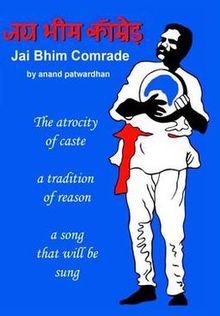Jai Bhim Comrade
Jai Bhim Comrade is a 2011 Indian documentary film directed by Anand Patwardhan. The film begin with a description of police violence in the 1997 Ramabai killings. It goes on to explore various aspects of the lives and politics of Dalit people in Mumbai. The film tookyears to produce, and was released in 2011 after the conclusion of the court trials that followed the Ramabai incident. The film was widely shown both nationally and internationally, and received an overwhelmingly positive reaction. It has won numerous national and international awards.
The film then shows interviews with many of Ghoghres colleagues, who discuss the state of Dalit politics in India. In a voiceover, Patwardhan describes the life of Ambedkar, and his activism against the caste system. The interviews are interspersed with other Dalits describing difficulties and discrimination they face in their lives. This section of the documentary also explores the relationship between the Dalit activist movement. The film describes the complicity of the Shiv Sena in the Ramabai killings, and shows Bal Thackeray at a public rally stating that Muslims need to be exterminated. The film then contrasts the Shiv Senas attempts to portray itself as the champion of the Dalit cause, with the speeches and songs of the Dalit leaders attempting to counteract this.The second part of the film focuses on contemporary Dalit activism, chiefly the activities of the Kabir Kala Manch, a troupe of singers using their performances to raise awareness and support for their cause. Many clips of songs and protests are shown, together with interviews with the leaders of the troupe. The film describes the initial successes of the troupe during the protests that followed the Khairlanji massacre in 2006. The ideology of the group was a mixture of that of Ambedkar fused with leftwing ideology. However, the group was soon branded a Naxalite outfit, and led to it being targeted by the Antiterrorist squad. Several members were forced to go on the run, while others were arrested. The film ends with interviews with the mothers of two of the members of Kabir Kala Manch that had been forced to go underground. ........
Source: Wikipedia

